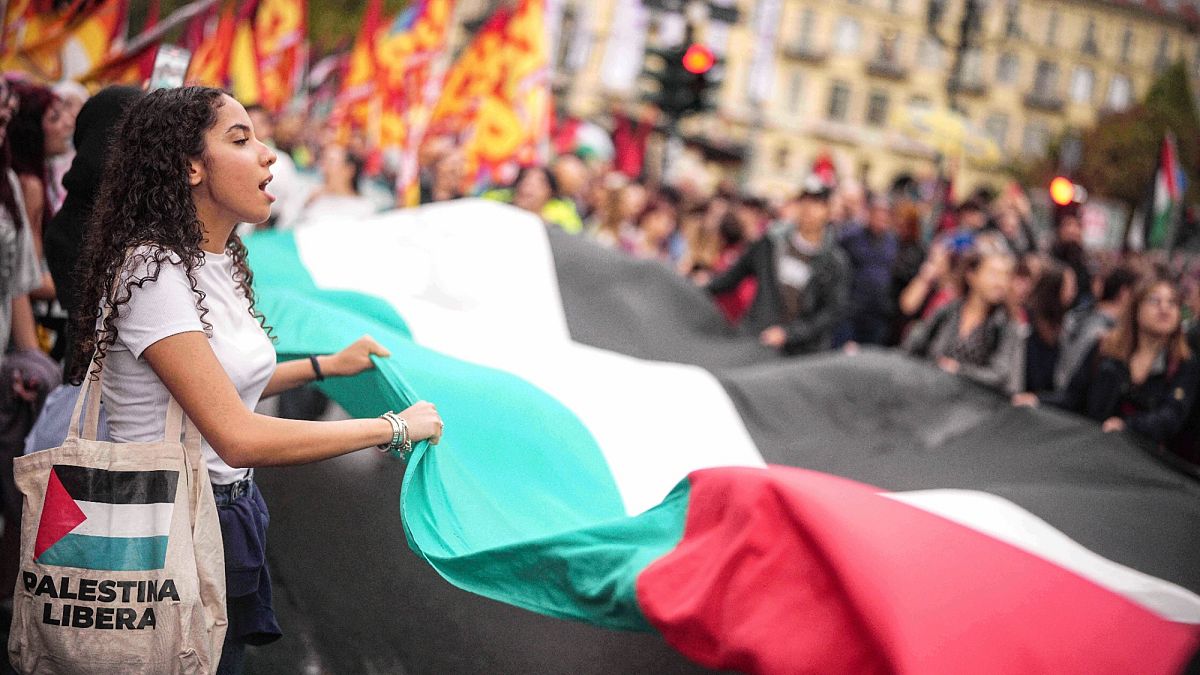
ADVERTISEMENT
Italy’s right-wing government will not recognise the state of Palestine, despite several other EU member states moving to do so this week – but Premier Giorgia Meloni’s stance appears at odds with Italian public sentiment and triggered a wave of protests in Italian cities.
A general strike took place on Monday across Italy involving around 500,000 people, in response to “the ongoing genocide in the Gaza Strip, the blockade of humanitarian aid by the Israeli army and the threats against the international Global Sumud Flotilla mission”, as a statement from the USB trade union federation stated.
Recognising Palestine is one of the requests coming from the so-called “pro-Pal Movement”, a heterogeneous set of civil society organisations, grassroots trade unions, and ad hoc citizens’ associations.
It comes together with the call to put pressure on Israel to stop the war, and with the request to forbid any export of weapons and military components from Italy to Israel.
According to a recent survey cited in the domestic media, 40.6% of Italians favour recognising a fully sovereign Palestinian state, the most chosen among the options presented, while 21.9% of the respondents preferred a temporary international administration to be put in place.
Another survey by the Italian project YouTrend shows how Italians are critical of Israel’s actions in the wake of the Hamas attacks of 7 October 2023.
Among respondents, 60% considered Israel “should withdraw from all the occupied territories in the West Bank”; 63% considered “it is committing a genocide in the Gaza Strip”; 64% believed that “it oppresses and systematically discriminates against the Palestinian people”, and 65% considered Israel’s reactions to the Hamas attacks “disproportionate” and “mainly targeting innocent civilians”.
According to YouTrend’s founding partner Lorenzo Pregliasco, the beginning of 2025 marked a turning point in Italian public opinion. Even the voters of political parties closer to Israel – like the right-wing Fratelli d’Italia or centre-right Forza Italia – started to express criticism against the Israeli government’s actions.
“I think that the extensive media coverage of the Gaza war, showing the humanitarian issues in the strip, has really touched people who did not have a strong opinion on the issue,” Pregliasco told Euronews in an interview.
In his opinion, this also provoked a gradual shift in Giorgia Meloni’s government’s position. “Of course, they do not want to have a radical approach, like the leftist parties have. But I noted a clear evolution, especially with recent strong criticism of the war, of the ground invasion of Gaza, of the humanitarian consequences of Israeli bombing,” he said.
Criticism of Israel and defence of Palestinians have long characterised Italian left-wing parties, but today Pregliasco sees less distance between the government’s and opposition’s stances on the issue.
However, some elements of difference, which he considers “symbolic”, remain. Meloni refuses to label Israeli military action in Gaza as “genocide”, or to recognise the state of Palestine – which is endorsed by the leftist Democratic Party (PD), Five Stars Movement (M5S), and Green/Left Alliance (AVS).
As Italy’s Foreign Minister, Antonio Tajani, recently said, Rome sticks to its position: a Palestinian State does not exist now, and therefore it cannot be recognised. “Before recognising it, a state should be built up. We cannot make a gift to Hamas,” he said on the sidelines of the UN General Assembly in New York.
While Italy is in favour of the “two-state solution”, Tajani considers that other countries’ recognition of Palestine is “not much use” at the moment.
Like Germany, Rome’s government will likely stick by its refusal to recognise Palestine, even if the majority of other EU member states do so.
Unlike in Germany, however, Meloni can be less comforted that she represents the majority of public opinion on the issue.
For Meloni, the entire Palestine issue “is like a blanket that’s too short — you can’t cover everything at once”, says Lorenzo Pregliasco, as she tries to cover her political line and hold off mounting pressure from public sentiment.
